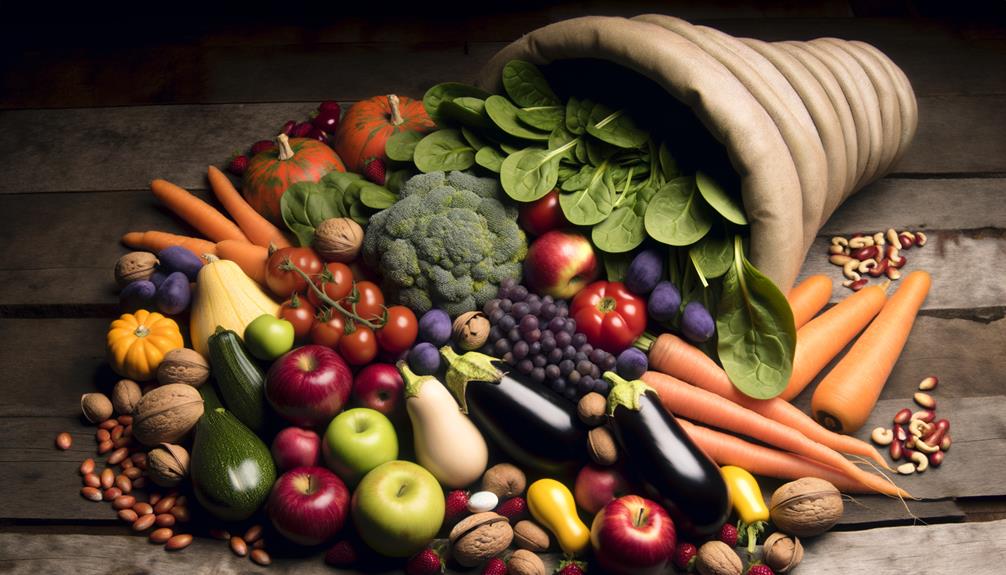Vibrant vegetables, fabulous fruits, and bountiful beans; these are just the beginning of what you’ll encounter on a vegan voyage. You’re not just choosing a diet; you’re embracing a lifestyle that reveres reverence for life and a respect for cultural traditions that have long celebrated plant-based sustenance. By turning to a vegan diet, you’re joining a movement that seeks to harmonize personal health with ethical responsibility and environmental sustainability. It’s a choice that not only transforms your plate but also has the potential to positively impact the planet and its inhabitants. As you ponder the profound implications of what’s on your fork, consider how this transition could change more than just your own life. The journey ahead promises a tapestry of tastes and a convergence of compassion and conservation that you’ve yet to fully explore.
Key Takeaways
- Transitioning to a vegan diet can lower the risk of heart disease, type 2 diabetes, and certain types of cancer.
- A vegan diet can provide essential nutrients, antioxidants, and healthy plant-based proteins to nourish the body.
- Adopting a vegan diet can support a thriving microbiome, enhance insulin sensitivity, and promote cardiovascular health.
- Embracing a vegan lifestyle can contribute to the body’s natural healing processes, protect cognitive function, and create a more ethical and sustainable world.
Understanding Vegan Benefits
Embracing a vegan diet not only aligns with ethical principles but also unlocks a multitude of health benefits, including protection against chronic diseases and improved bodily functions. By forgoing animal products, you’re choosing a life of compassion that serves the well-being of all sentient beings. You’re also embarking on a journey to safeguard your health.
The benefits of a vegan diet are far-reaching. You significantly lower your risk of heart disease, type 2 diabetes, and certain types of cancer by avoiding saturated fat prevalent in meat and dairy. Instead, you nourish your body with whole foods, rich in essential nutrients, antioxidants, and healthy plant-based proteins. These plant foods foster a thriving microbiome, enhance insulin sensitivity, and support robust cardiovascular health.
Moreover, by adopting a healthy plant-based diet, you’re not just preventing illnesses; you’re actively promoting your body’s natural healing processes. The diversity of a plant-based diet, abundant in micronutrients, ensures that your body operates at its peak, protecting your cognitive function and enhancing your vitality throughout all stages of life.
In serving yourself this way, you’re better equipped to serve others. A vegan diet is a testament to the profound impact that personal choices can have on our collective well-being.
Tailoring Your Transition
As you recognize the profound benefits of a vegan lifestyle, it’s essential to tailor your approach to plant-based eating that respects your unique journey and dietary needs. Transitioning to a vegan diet plan isn’t a one-size-fits-all process, and making one that suits you is key. Whether you’re considering going cold turkey or taking a more gradual path, the following steps can guide you:
- Gradually cut out animal ingredients to ease into vegan meals.
- Explore a variety of vegan foods, including tasty soy products.
- Educate yourself on meal planning to ensure balanced, nutritious vegan meals.
- Connect with supportive communities that share your passion for ethical living.
- Pay attention to your body’s needs and adapt your diet accordingly.
As you go vegan, remember that cutting out dairy and meat isn’t merely about what you’re giving up; it’s about embracing a compassionate lifestyle that serves both your health and the welfare of animals. Experiment with diverse flavors and textures, and consider the cultural richness that plant-based eating brings to the table. Tailoring your transition allows you to explore this new horizon at your own pace, ensuring a fulfilling and sustainable shift to a vegan diet plan.
Overcoming Common Challenges
Navigating the social dining landscape and addressing nutritional concerns are key hurdles you’ll encounter on your journey to a vegan lifestyle. When going vegan, you’ll need to find new ways to enjoy social meals without compromising your values. Plant-based alternatives to animal-based foods are increasingly available, making it easier to maintain your commitment even when dining out. You can also share easy vegan recipes with friends, turning dinner parties into opportunities for collective exploration of new foods.
To make sure you’re meeting all your nutritional needs, educate yourself on where to get essential nutrients that are typically found in animal products. Remember, highly processed foods are often lacking in nutritional value, so focus on whole, plant-based ingredients. You’ll discover a vibrant variety of produce that not only sustains you but also aligns with your ethical dedication to serving others by sparing animal lives.
Social media can be a supportive space to connect with fellow vegans and find inspiration for your meals. There, you can exchange tips and cheer each other on as you navigate the initial adjustment period. Encountering skepticism is part of the process, but stay true to your purpose, and you’ll find that your choices can inspire positive change in your community.
Maintaining Nutritional Balance
To maintain your health and uphold your ethical commitment to a vegan lifestyle, you’ll want to ensure your diet includes a wide array of plant-based foods that provide all the essential nutrients your body needs. Achieving nutritional balance is about more than just choosing to avoid animal products; it’s about embracing the abundant variety that nature offers to nourish your body and soul.
Here are key components to consider:
- Plant-based protein: Incorporate sources like black beans, lentils, and tofu to fuel your body effectively.
- Vitamin B: Opt for nutritional yeast, fortified soy milk, or supplements to keep your energy levels up.
- Vitamins and minerals: A rainbow of fresh produce ensures a spectrum of essential nutrients.
- Whole grains: Select quinoa, brown rice, and oats for fiber and satiety.
- Healthy fats: Add flaxseeds and walnuts to your meal prep for those vital omega-3s.
Embracing New Food Horizons
Dive into the world of veganism and discover the health and ethical benefits of a plant-strong diet, rich in life-sustaining nutrients that protect against chronic diseases and support a compassionate lifestyle. As you transition, you’ll find that eating whole, unprocessed foods not only serves your body but also serves a greater, kinder purpose.
You’re not just eliminating animal-based foods; you’re embracing new plant-based foods that bring variety and joy to your meals. Every crunchy carrot and every succulent berry is a testament to the richness of the earth’s bounty. Exploring tasty vegan options expands your culinary repertoire and opens your heart to new cultures and traditions.
By planning your meals, you can easily weave these new foods into your life. The convenience of pre-cooked ingredients and frozen vegan sauces can turn meal preparation into a seamless experience. Remember, every plant-based meal you create is a step towards a more ethical and sustainable world.
You’re not just changing what’s on your plate—you’re becoming part of a global movement that values health, compassion, and sustainability. Let the adventure of new vegan foods inspire and sustain you on this rewarding journey.
Frequently Asked Questions
Why Are People Switching to Vegan?
You’re embracing veganism for ethical considerations, prioritizing animal welfare, environmental impact, and health consciousness. It’s about dairy allergies, weight management, food ethics, global sustainability, culinary exploration, and personal beliefs, all served with a heart for others.
Why Do People Switch to a Plant-Based Diet?
You switch to a plant-based diet for ethical concerns, better health, and weight management. It’s kinder to animals, eases global hunger, and lessens environmental impact, aligning with your service to others and the planet.
What Happens When You Switch to a Vegan Diet?
When you go vegan, your gut microbiome thrives, enhancing nutrient absorption and detoxification. You’ll notice increased energy, clearer skin, hormonal balance, fewer allergies, digestive ease, a stronger immune response, and lower inflammation markers.
Why Might Someone Choose a Vegan Diet Benefits?
You’ll embrace a garden of health, sowing seeds for ethical growth, a lighter footprint, and nurtured well-being. Your choice feeds compassion, curbs allergies, manages weight, and cultivates vibrant energy and robust gut health.







